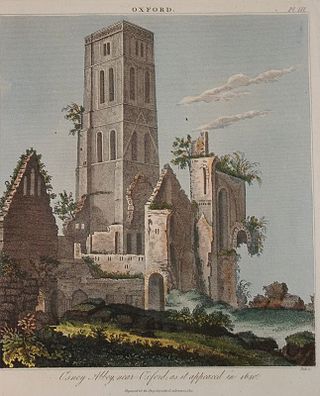Synod of Oxford
Synod held on 9 May 1222 From Wikipedia, the free encyclopedia
The Synod of Oxford was held on 9 May 1222, at Osney Abbey,[1] in Oxford, England.[2] It was a council of the (Catholic) church in England, convened by Archbishop Stephen Langton. It is notable for a number of the decisions taken and canon laws set.

During the Synod, "harsh anti-Jewish laws" were enacted: "social relations between Jews and Christians were blocked; church tithes were levied against Jews, and English Jews were forced to wear an identifying badge. The construction of new synagogues was also prevented."[2][3][4][5][6][7][8][9][10]
For many centuries, it was thought that the decision that Saint George's Day should be celebrated as a holy day in England was made at this Synod.[1] However, since the 1960s, this has been regarded by historians as an invention.[11][12]
The Synod
Langton's ambition was to reform the English church, especially with regard to monastic law.[13] The Synod also established celebration of the Feast of the Circumcision of Christ on 1 January, building on long-established celebrations of the start of the Julian calendar year.[13]
The Synod also followed and implemented the anti-Jewish decrees laid out by the Fourth Lateran Council of 1215.[7]
Saint George's Day
For many centuries, it was thought that the Synod set the celebration of 23 April as Saint George's Day on a par with other Christian feast days, although it stopped short of declaring St George the patron saint of England, which did not happen until 1347.[14] However, in 1961, historian C. R. Cheney published research in the Bulletin of Historical Research, followed by further published research in 1964,[11] that "conclusively refuted ... [this] misapprehension",[11] based on showing that the earliest surviving manuscripts of the synod's declaration do not mention the feast of St. George.[15] Nonetheless, modern sources sometimes still continue to assert the connection.[1][12]
Legacy
According to the Diocese of Oxford, these "prejudicial" laws passed at Oxford in 1222 were the precursor to further anti-Jewish statutes,[7] in particular those passed in 1253 and 1275. This increasing intolerance culminated in the expulsion of the Jews from England in 1290.[7]
2022 anniversary
In May 2022, to mark the 800th anniversary of the Synod, a service was held at Christ Church Cathedral, Oxford.[16] There, representatives of Christians and Jews met. Although the Church of England as currently constituted dates to the 16th-century English Reformation, it claims continuity with the pre-Reformation English church,[17] and Anglican leaders have insisted on the importance of an apology.[2] Archbishop Justin Welby said on Twitter that "it was an opportunity to 'remember, repent and rebuild'."[2]
References
Wikiwand - on
Seamless Wikipedia browsing. On steroids.
